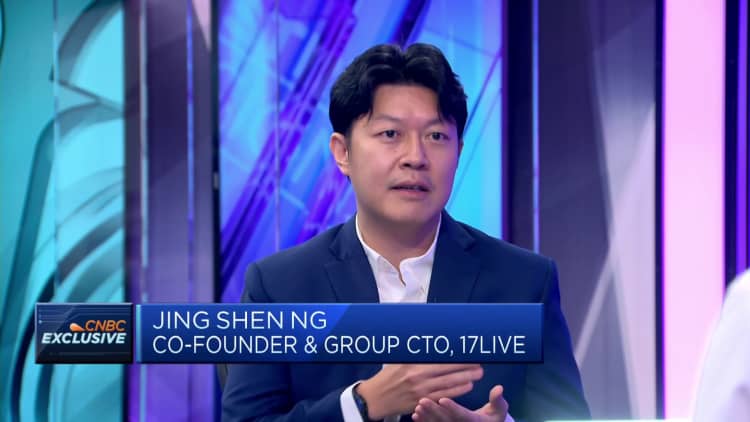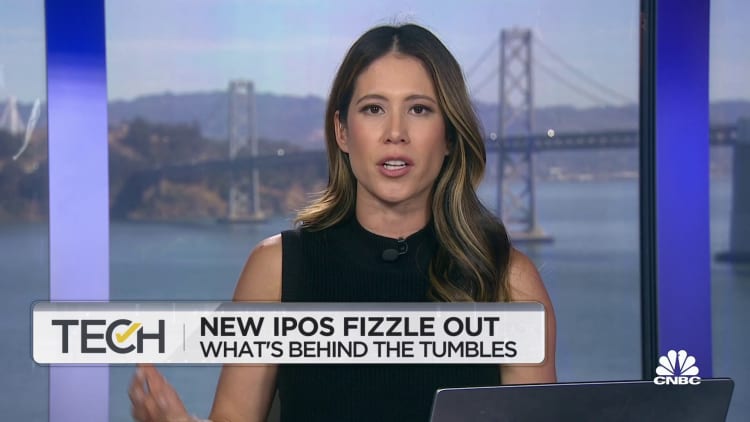[ad_1]
A live-streamer at a 17LIVE event.
17LIVE
In a first for Singapore, shares of 17LIVE began trading Friday following the Asian livestreaming company’s merger with a special-purpose acquisition company.
Shares of 17LIVE fell 2.06% to 3.80 Singapore dollars ($2.84) after opening at SG$4.
This was Singapore’s first listing via a SPAC merger. SPACs, or blank-check firms, are shell companies that raise capital in an IPO and use the cash to merge with a private company in order to take it public.
“We may see more SPACs coming on board,” said Deloitte in a Nov. 16 report, referring to17LIVE’s merger with Vertex Technology Acquisition Corporation.
Singapore’s first SPAC, VTAC, was listed in January 2022. It is backed by Vertex Venture Holdings, the venture capital arm of Singapore’s sovereign wealth fund, Temasek Holdings.
Local SPACs have two years to acquire a company, with the option for a one-year extension, subject to certain conditions.
Ng Jing Shen, co-founder at 17LIVE, told CNBC on Friday that the company opted to list via a SPAC merger because the blank-check firm was headed by its longtime partner, Vertex. He added that a traditional IPO would have taken longer, while SPAC offered them capitalization early on.
“The more time we save, the more we can capitalize and capture the growth opportunities that we see right now in Southeast Asia.”

“We see ourselves as a global livestreaming platform. Singapore is a global financial hub so we think it’s a great launchpad for us,” Ng told CNBC ahead of the listing.
The livestreaming platform allows users to interact in real-time with streamers and send them virtual gifts. About 16% of 17LIVE’s monthly active users spend money, with the average monthly revenue generated from each spending user at $302 a month, according to the firm.
“In our business model, we don’t make money from ads. Our business is not in views, it is in interactivity. So we make money off gifts that our users can buy from us,” said Ng.
“They buy these gifts and they give it to the streamers to support them in whatever goal or whatever competition that’s being run. And then we do a revenue share with the streamers,” said Ng, without revealing numbers.
The platform had about 87,000 contracted live streamers as of end June. These content creators are sourced from agencies or through talent scouting, with the contract duration ranging between one and seven years.

“Once they sign with us, they actually go through a training program within our in-house talent management agency. So we teach them how to stream, how to use equipment, how to use the app. And then once they start, we have talent managers to watch their livestreams and guide them along the way,” said Ng.
Launched in 2015 in Taiwan, 17LIVE expanded into Japan in 2017 which now accounts for 70% of its revenue while the rest comes from Taiwan and Southeast Asia, according to the company.
The app also allows users to use their smartphones to upload an avatar and conduct virtual streaming.
The market size for virtual idol, or computer-generated characters designed to resemble real people, in Japan is expected to increase to $3.86 billion by 2027 from $630.7 million in 2022, according to the SPAC merger filing.
In 2022, 17Live generated operating revenue of $363.7 million and incurred a loss of $51 million, according to the filing.
Bid to boost listings market
In September 2021, the Singapore Exchange became Asia’s first major bourse to allow SPAC listings in a move aimed at attracting more firms to list in the city-state amid a stagnating IPO market.
Even before the pandemic, the exchange saw more delistings than listings. From 2009 to 2019, there were 302 delistings, while only 279 companies listed in Singapore, Tharman Shanmugaratnam, who was minister in charge of Singapore’s central bank and is now the country’s president, said in 2020.
“We hope we are showing that there’s an alternative for companies which are fast growing, instead of directly listing in Hong Kong or the U.S.,” Vertex Holdings CEO Chua Kee Lock told CNBC.
Hong Kong has been trying to stimulate its IPO market, with the Hong Kong Stock Exchange in September proposing measures to enhance its appeal for small- and medium-sized enterprises with high-growth potential.
In August, the Hong Kong government announced a task force to “enhance” stock market liquidity in order to bolster the development of its capital market.
17LIVE has listed amid macroeconomic uncertainties fueled by high inflation, interest rate hikes, and volatile markets. Unlike the stock frenzies of 2020 and 2021, several companies have delayed their listings since 2022, adopting a wait-and-watch approach.
SPAC IPOs fell 76% in the first half of 2023 compared with the same period a year earlier, according to a report by financial and risk advisory firm Kroll.
On why 17LIVE was listed amid an environment of economic uncertainty, Chua said: “I think the market will come back.”
“What is up can never go up forever, right? … What is down cannot be down forever, too.”
[ad_2]
Source link
